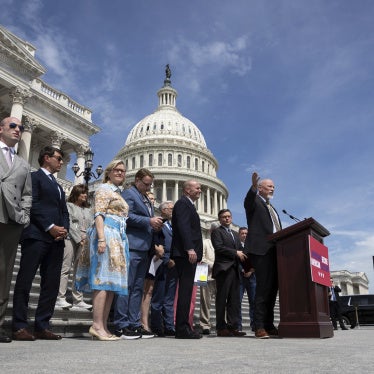Former President Jimmy Carter should speak out boldly about the need for human rights reform in Cuba, Human Rights Watch said today.
As part of his five-day visit to the island, Carter will hold several meetings with Cuban President Fidel Castro, and will also be allowed to address the Cuban people directly. On Tuesday evening, he will make a live, televised speech from the main auditorium of the University of Havana.
"Carter has a rare and invaluable opportunity to speak to the Cuban people about human rights," said José Miguel Vivanco, executive director of the Americas Division of Human Rights Watch. "For Cubans, unaccustomed to public statements on human rights -- much less a full, uncensored discussion of such questions -- the prospect of such a speech is exceptionally promising."
Visiting the island on the personal invitation of Cuban President Fidel Castro, Carter is the highest-profile U.S. figure to set foot in Cuba since Castro came to power in 1959. By traveling to the island and pursuing a dialogue with President Castro, he is implicitly criticizing the more than 40-year U.S. embargo on Cuba and the approach to Cuba policy that it represents.
Human Rights Watch pointed out that the expectations surrounding Carter's trip stem not only from the fact that he is the first U.S. president -- in or out of office -- to visit Castro's Cuba, but also from his prominence with regard to human rights. Having frequently raised human rights concerns during his presidency, making them a high-profile element of his foreign policy, Carter has real credibility on rights issues.
"In Latin America, especially, Carter's name is virtually synonymous with human rights," said Vivanco.
Human Rights Watch said former President Carter should use his meetings with President Castro to call on the government to release political prisoners, to ease restrictions on speech and assembly, to recognize the legitimacy of political opposition, and to grant access to Cuban prisons to representatives of the International Committee of the Red Cross.
"But equally important - perhaps even more important - Carter should speak out forcefully on these issues before the Cuban public," said Vivanco. "During his televised address to the Cuban people, he could break new ground by mentioning political prisoners such as Oscar Elias Biscet and Francisco Chaviano Gonzalez by name."
Human Rights Watch compared Carter's trip to that of Pope John Paul II, who made dramatic public calls for political pluralism, religious freedom, and the release of political prisoners when he visited Cuba in 1998.
Cubans themselves, Human Rights Watch emphasized, have no opportunity to criticize their government's human rights policies in public. Not only does the Cuban government control what appears on television and in newspapers, Cuban laws impose stringent restrictions on speech under the guise of protecting state security. By enforcing broadly-worded prohibitions on "enemy propaganda," the spreading of "unauthorized news," and other speech offenses, the Cuban authorities keep the public discourse free of political viewpoints at odds with the government.
A closed society, Cuba also bars independent human rights groups such as Human Rights Watch from conducting routine research and advocacy visits to the island, a restriction that makes it unique in the Western Hemisphere. It has a deplorable track record with regard to U.N. human rights monitoring mechanisms, having denied access to the U.N. special rapporteur on Cuba for several years, until the rapporteur's mandate was finally discontinued.







